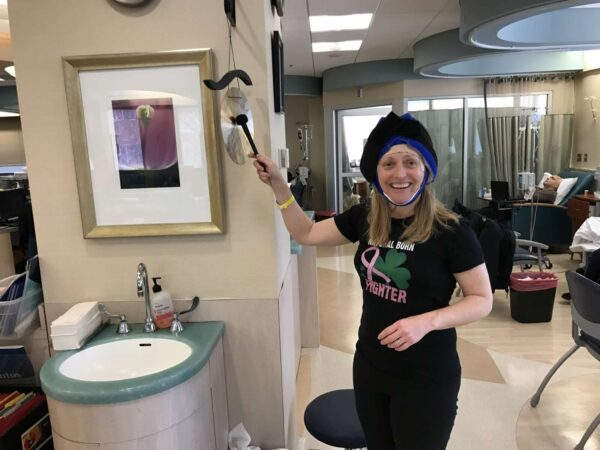
When Donaldson Run resident Liz Lord learned that she had breast cancer in late 2016 and needed to receive chemotherapy, she had lots to worry about.
One thing that might not be a matter of life and death, but is a common concern: her hair.
“At the time, because I had a seven and a nine-year-old, I was really concerned about how [losing my hair] would affect their state of minds, knowing that I was now seriously ill,” Lord told ARLnow.
She reached out to one of her son’s teachers, who had gone through a similar experience and had managed to retain a lot of their hair. That teacher told her about cold caps.
Cold caps are freezing-cold, helmet-like gel caps worn on the head. They narrow blood vessels in the scalp, which helps reduce the amount of chemotherapy medicine that can reach the hair follicles.
While it’s proven to work and is FDA-approved, there are logistical challenges associated with the treatment. This includes needing help to put it on the patient’s head and the relatively high cost. If worn for every round of chemo, prices can soar to thousands of dollars.
While Lord was able to afford the treatment and her husband (communications professional and ARLnow cartoonist Mike Mount) was able to assist, not everyone has those privileges. Plus, cold caps are often not covered by health insurance.
That’s why, in 2018, Lord help start Cold Capital Fund, a local non-profit that helps patients secure and afford cold caps.
Losing one’s hair from chemo can be a traumatic experience, not just physically but mentally as well.
“The primary driver for most patients… is privacy, normalcy, and dignity,” said Lord.”There’s some research… that when you look like yourself and feel like yourself, you have better outcomes relative to treatment.”
The way Cold Capital Fund works is that patients apply for either $500 or $1,000 of assistance. Lord encourages everyone in need to apply. Cancer and treatments are very expensive, she said, plus adding in a number of ancillary costs can make patients think they can’t afford cold cap treatment.
While $500 or $1,000 doesn’t always cover the entire cost of the treatment, it can put a significant dent in it. Plus, Cold Capital Fund has a relationship with two cold cap manufacturers and notifies the companies when a patient is approved for assistance. In turn, the companies apply a 25% discount.
When all is said and done, many patients end up getting about half of their cold cap treatments paid for.
Over the last four years, Cold Capital Fund has provided approximately $105,000 of financial assistance to about 125 patients across the region. Mostly, they are breast cancer patients like Lord was.
Recently, the organization has seen a marked rise in applications.
“More people have struggled during Covid financially, particularly in 2020 and early 2021,” she said. “A lot of the applications we receive talk about job loss, company shutdowns, all sorts of extenuating circumstances that made it additionally hard for these patients to be able to cover the cost of this.”
It has also become harder for Cold Capital Fund to receive the needed money. Big in-person fundraising events didn’t happen for several years, with the organization relying on individual donors and grants from smaller foundations. Lord said that while fundraising is always hard, it’s been a particular challenge as of late.
“Funds are starting to dwindle,” she said.
Cold caps are not completely effective for every person. However, if a patient is able to retain close to 50% of their hair, the treatment is considered a success.
“At 50%…nobody’s going to know that you went through chemotherapy,” Lord said.
She hopes that cold caps will one day become a “standard of care” for patients going through chemotherapy and that insurance covers it. But until that happens, Liz Lord and Cold Capital Fund will continue to help out those in need.
“It’s not an easy task to endure that freezing component while undergoing chemotherapy,” said Lord. “But a lot of patients are determined to maintain that normalcy, privacy, and to define their cancer experience on their own terms.”

